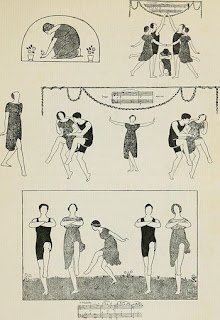 |
| Gregory's Moralia in Job |
Progress is assumed to be a good thing – and sometimes we progress in the right direction.
None may break ranks, though nations trek from progress. (Wilfred Owen)
In the UK, several jobs had marriage bars until the 1970s, and the British Geological Survey required women to resign on marriage until 1975. The marriage bar was abolished in 1946 for the Home Civil Service and in 1973 for the Foreign Service: until then women were required to resign when they married. There was a marriage bar for teachers – this was removed for all teachers (and BBC staff) in 1944, and the practice was made illegal by the Sex Discrimination Act 1975. (Wikipedia)
In the 4th century Gregory of Nyssa wrote a denunciation of slavery in his fourth homily on Ecclesiastes. (Liam Hogan @Limerick1914)
1171 The Council of Armagh frees all Englishmen and women who are enslaved in Ireland.
1837 Britain abolishes punishment by pillory.
1867 John Stuart Mill proposes that women be granted the same rights as men.
1910 Oaths Act abolishes the practice of kissing the book on taking an oath.
1949 Beverley Bolin is the first woman to become a registered architect in South Australia.
1954 Diane Leather is the first woman to run a mile in under 5 minutes, with a time of 4 min 59.6 secs, during the Midlands Women’s AAA Championships at Birmingham’s Alexander Sports Ground, 23 days after Roger Bannister ran the first sub 4-minute mile.
1958 Maria de Filippis is the first woman to enter Formula One.
2000 Fur farming is banned in the UK.
2013 France repeals the law forbidding women to dress as men in public without a permit.
2019 Fracking is suspended in the UK after exploratory drilling causes earthquakes.
2020 France's Assemblée Nationale makes glottophobie an offence along with racism, sexism and other forms of bigotry. (They mean "discrimination against people with regional accents".)
February: The Education Secretary announces that schools will be told to not to teach speculation as fact but to give a balanced view (on gender and "critical race theory").
There has been a 73% drop in teenage pregnancies in Ireland since 2000, thanks to "increased educational attainment, high levels of contraception use".
February, March Sweden and then France advise caution on hormone treatments for children with gender dysphoria.
Violinist Nicola Benedetti is first woman and first Scot to head the Edinburgh Festival.
March US House passes an Act prohibiting discrimination based on hair textures or styles. (Cue outcry of "Haven’t they got anything better to do, this isn’t an issue" etc.)
Wales bans smacking children. Children’s Commissioner calls for smacking ban in England.
April UK bans cruel rodent glue traps.
In France, average alcohol consumption has declined by 75% since the 1960s. (The graph is headed "La spectaculaire déclin de la consommation d’alcool".)
April UK bans virginity testing and hymenoplasty (reconstruction).
Intu Potteries ditches unisex loos to bring back male and female toilets. (stokesentinel.co.uk)
Employers are to be reminded they may legally restrict some job vacancies to women only, following an intervention from the Equalities and Human Rights Commission. (Times)
April The Divorce, Dissolution and Separation Act... means couples no longer have to separate for two years and can get a “no fault” divorce. You can apply individually or jointly, and wrap up everything within about six months. (Times)
May The Department for Education is seeking new powers that would allow it to take action against illegal schools. Ofsted will be given new powers to seize materials during inspections.
May Bristol Libraries has cancelled 'Drag Queen Story Hour' after concerns were raised about its appropriateness for children.
May This week, the Government is expected to announce that it is rewriting guidance on drafting legislation to make clear that gender-neutral language should not replace terms such as "woman" and "mother".’ (Telegraph)
I’m extremely proud and honoured to announce that I have been invited to become the first woman in history to hold the position of Juror for the Court Leet of the King’s Manor in Southwark. (Mudlarker Lara Maiklem)
Bird deaths down 70% after painting wind turbine blades, says a Norwegian study.
Non-fatal strangulation is now a crime in the UK.
June The NHS has been ordered to use the term ‘woman/en’ when it is called for and to cease forthwith from removing this word from the language used by the health service. (@mc_moira)
June The US Senate has passes new gun safety legislation.
LESS THAN CHEERFUL
1753 New legislation allowed Jews to become British citizens. After public outrage, the law was hastily repealed the next year.
Early 1960s Katharine Whitehorn recalled that a leaving party for a loved male colleague was held in a gentlemen’s club and she, the only woman on the team, couldn’t attend.
2022 The global trade in exotic pets is worth $300 billion a year.
2022 EU states import around 4,000 tons of frogs’ legs every year.
2022 The government has dropped attempts to ban imports of fur, foie gras and hunting trophies.
More here, and links to the rest.










.jpg)
